Working Papers
| Publication Cover | Title |
|---|---|
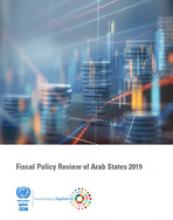 |
Fiscal Policy Review of Arab States 2019 E/ESCWA/EDID/2019/WP.20 This fiscal review is first in the series following the ESCWA 2017 flagship report “Rethinking Fiscal Policy for the Arab Region”. A major focus of this fiscal policy review 2019 is to create a... |
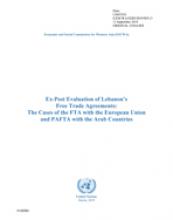 |
Ex-Post Evaluation of Lebanon’s Free Trade Agreements: The Cases of the FTA with the European Union and PAFTA with the Arab Countries E/ESCWA/EDID/2019/WP.13 This study examines the tangible impact of the integration agreements with Arab countries and the European Union on the Lebanese economy, as well as the reasons behind their relatively poor... |
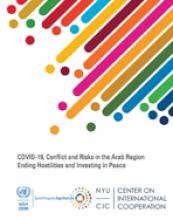 |
COVID-19, Conflict and Risks in the Arab Region E/ESCWA/CL6.GCP/2020/TP.6 Years of conflict or occupation have eviscerated Arab conflict affected countries’ social contracts, shattered their economies, amplified their household food insecurity, devastated their health... |
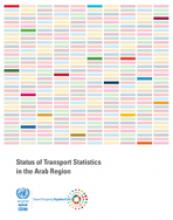 |
Status of Transport Statistics in the Arab Region E/ESCWA/CL4.SIT/2020/WP.1 The main purpose of this technical paper is to provide an analysis of the responses received in the questionnaire on transport data which was sent to the national statistical offices in the Arab... |
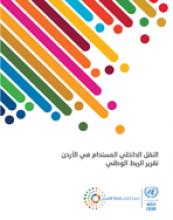 |
National Connectivity Report Jordan 2020 E/ESCWA/CL3.SEP/2020/TP.7 Last decades have witnessed a significant increase in the amount of transport of persons and goods resulting in economic growth and connectivity becoming high on the political agenda of countries... |
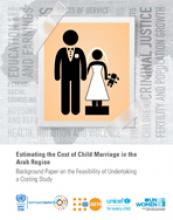 |
Estimating the Cost of Child Marriage in the Arab Region: Background Paper on the Feasibility of Undertaking a Costing Study E/ESCWA/CL2.GPID/2020/TP.2 Child marriage is a violation of human rights and a form of gender-based violence (GBV) that results in numerous adverse outcomes for a child’s development. In the past 25 years, the Arab region... |
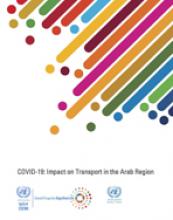 |
COVID-19: Impact on Transport in the Arab Region E/ESCWA/CL2.GPID/2020/TP.15 The COVID-19 pandemic has triggered a global health and economic crisis that has transformed the world. The Arab region is not immune to the shock triggered by the pandemic. In line with global... |
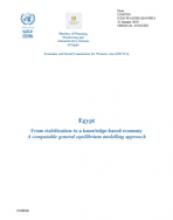 |
Egypt From stabilization to a knowledge-based economy A computable general equilibrium modelling approach E/ESCWA/EDID/2019/WP.2 The paper has two main objectives. First, it provides an overview of the Egypt’s main macroeconomic and social indicators, highlighting the impact of economic reforms implemented since 2016 and... |
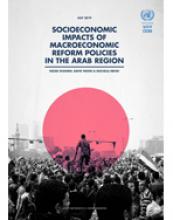 |
Socioeconomic Impacts of Macroeconomic Reform Policies in the Arab Region E/ESCWA/EDID/2019/TP.1 The technical paper aims to test that hypothesis by evaluating Tunisia and Egypt’s experiences with neoliberal adjustment against the SDGs. The UNESCWA expert group meeting Towards... |
 |
Social and Economic Situation of Palestinian Women and Girls (July 2016 - June 2018) E/ESCWA/ECW/2019/TP.2 The report covers the period from 1 July 2016 to 30 June 2018, which was characterized by major developments in the security and political situation in the occupied Palestinian territory. The... |
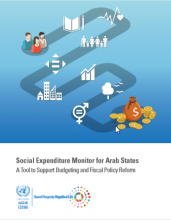 |
Social Expenditure Monitor for Arab States: A Tool to Support Budgeting and Fiscal Policy Reform E/ESCWA/EC.6/2019/8/Rev.1 Targeting public expenditure in line with social development priorities and macro-fiscal sustainability remains a challenge for most Governments in the Arab region. Budget allocations that... |
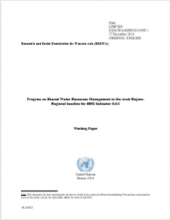 |
Progress on Shared Water Resources Management in the Arab Region: Regional baseline for SDG Indicator 6.5.2 E/ESCWA/SDPD/2018/WP.1 SDG indicator 6.5.2 is intended to monitor progress towards transboundary water cooperation through operational arrangements. The results of the first global reporting under SDG indicator 6.5.... |
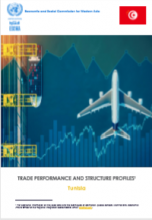 |
Trade performance and structure profiles: Tunisia E/ESCWA/EDID/2018/TP.8 This profile takes stock of the trade performance and structure of Tunisia since 1995. In addition to aggregate trends in trade and foreign direct investment, a wide range of trade indicators are... |
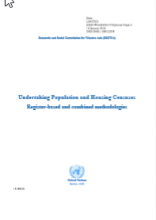 |
Undertaking Population and Housing Census Register-based and combined methodologies E/ESCWA/SD/2017/Technical Paper.3 The present report outlines the potential use of administrative registers in population and housing censuses. It focuses on the case study of Poland, which conducted a population census in 2011... |
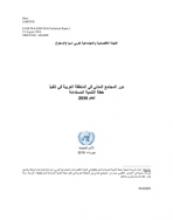 |
The Role of Civil Society in Implementing the 2030 Agenda for Sustainable Development E/ESCWA/SDD/2016/TECHNICAL PAPER.1 This paper aims at highlighting the role of civil society in implementing the 2030 Agenda for Sustainable Development at the national and regional levels. It includes six sections and discusses... |
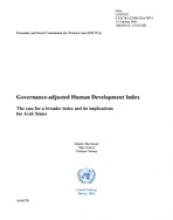 |
Governance-adjusted Human Development Index: The case for a broader index and its implications for Arab States E/ESCWA/EDID/2016/WP.3 Governance is the most important factor in explaining deviations in broad human development over time. Therefore, this paper contributes to the literature on improving human development... |
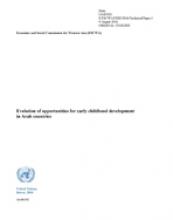 |
Evolution of opportunities for early childhood development in Arab countries E/ESCWA/EDID/2016/TECHNICAL PAPER.1 This technical study follows on a report detailing conditions for early childhood development (ECD) across the Arab region using the newest waves of national health surveys. Both the typical level... |
 |
Social and Economic Situation of Palestinian Women and Girls: July 2014 – June 2016 E/ESCWA/ECW/2016/Technical Paper.3 This report presents the main developments that affected the situation of women in Palestine between July 2014 and June 2016. Key events were the 50-day Israeli offensive on Gaza in the summer of... |
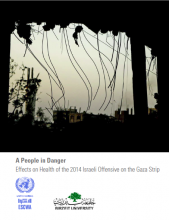 |
A People in Danger: Effects on Health of the 2014 Israeli Offensive on the Gaza Strip E/ESCWA/ECRI/2015/WP.5 The Gaza Strip has been subject to a near-total blockade by Israel since 2007 and to repeated military assaults, the most intense of which took place in 2006, 2008, 2012 and 2014. The more than... |
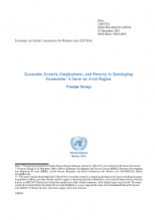 |
Economic Growth, Employment, and Poverty in Developing Economies: A focus on Arab Region E/ESCWA/OES/2015/WP.4 The study examines the nexus between economic growth processes, employment, poverty and inequality in the developing economies, and the Arab countries in particular, during the period 1990-2013.... |





